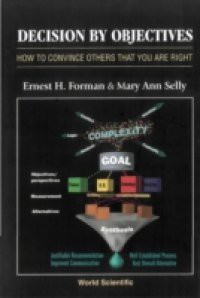Decision-making is a process of choosing from possible courses of action in order to attain goals and objectives. Nobel laureate Herbert Simon wrote that the whole process of managerial decision-making is synonymous with the practice of management. Decision-making is at the core of all managerial functions. Planning, for example, involves the following decisions: What should be done? When? How? Where? By whom? Other managerial functions, such as organizing, implementing, and controlling, rely heavily on decision-making.Decision by Objectives is an invaluable book about the art and science of decision-making. It presents a very practical approach to decision-making that has a sound theoretical foundation, known as the analytic hierarchy process. Intended for both the student and the professional, the book includes approaches to prioritizing, evaluating alternative courses of action, forecasting, and allocating resources. By focusing on objectives rather than alternatives alone, it shows the reader how to synthesize information from multiple sources, analyses, and perspectives. The methods presented have been gaining popularity throughout the world.Contents:Introduction: Management Decision-Making TodayProblem Solving and Decision-MakingDecision-Making Concepts and MethodologiesThe Analytic Hierarchy Process and Expert ChoiceFrom Brainstorming to Structuring to Evaluation and ChoiceOther Topics / RefinementsForecasting — The Forward ProcessResource AllocationMeetings, Meeting Facilitation and Group Support Systems (GSS)FeedbackEmpowered for the FutureReadership: Students and professionals in business, management, risk analysis and most branches of science.Key Features:Reflects recent developments in the fieldsAll the articles are contributed by renowned researchers

